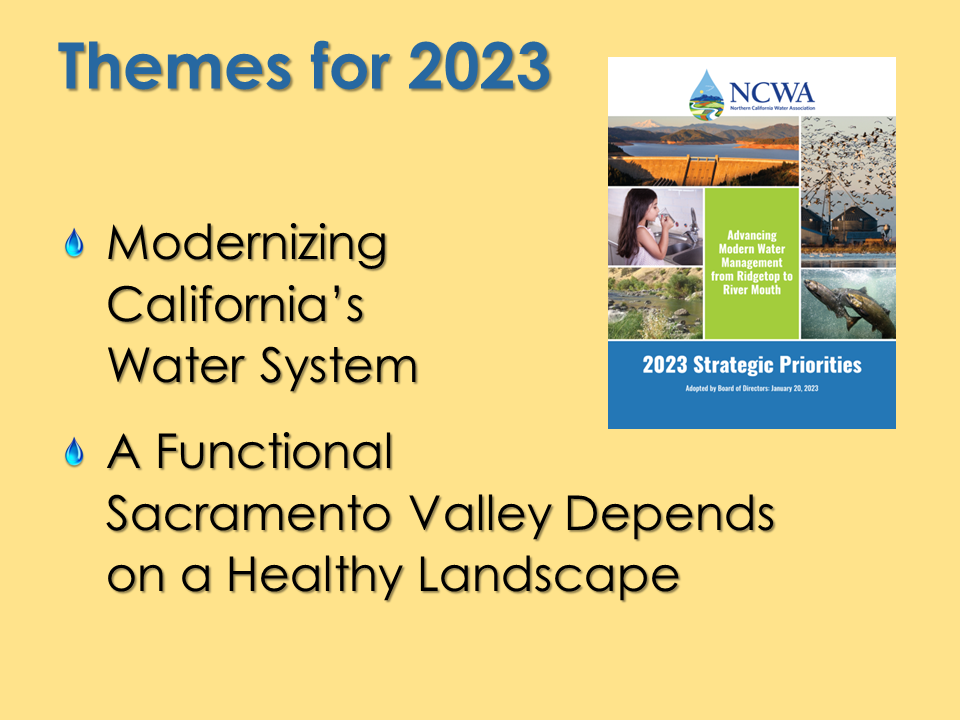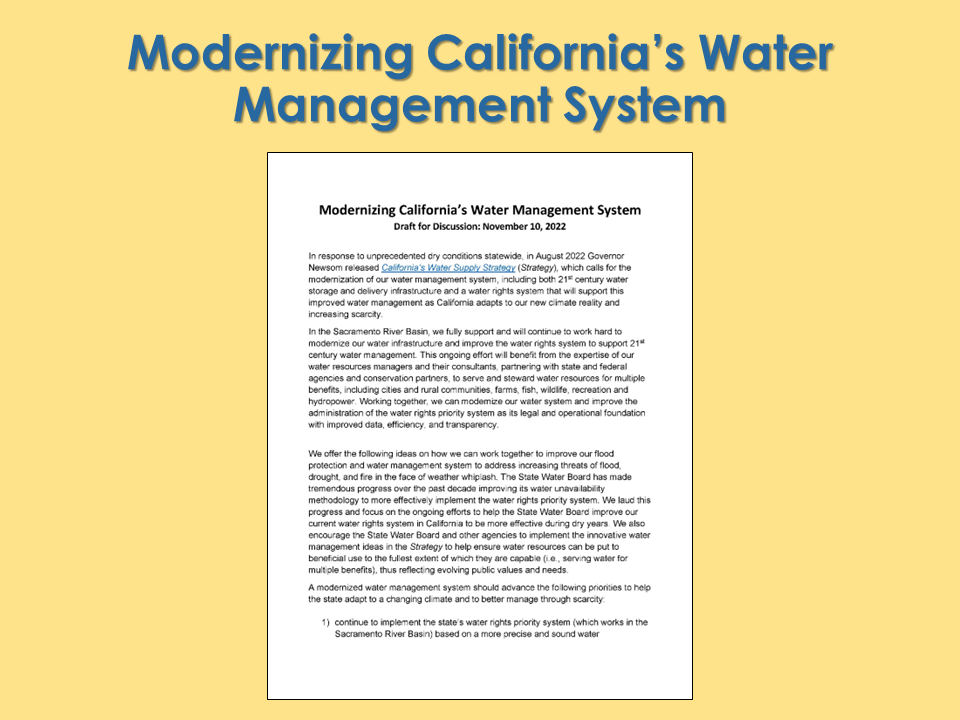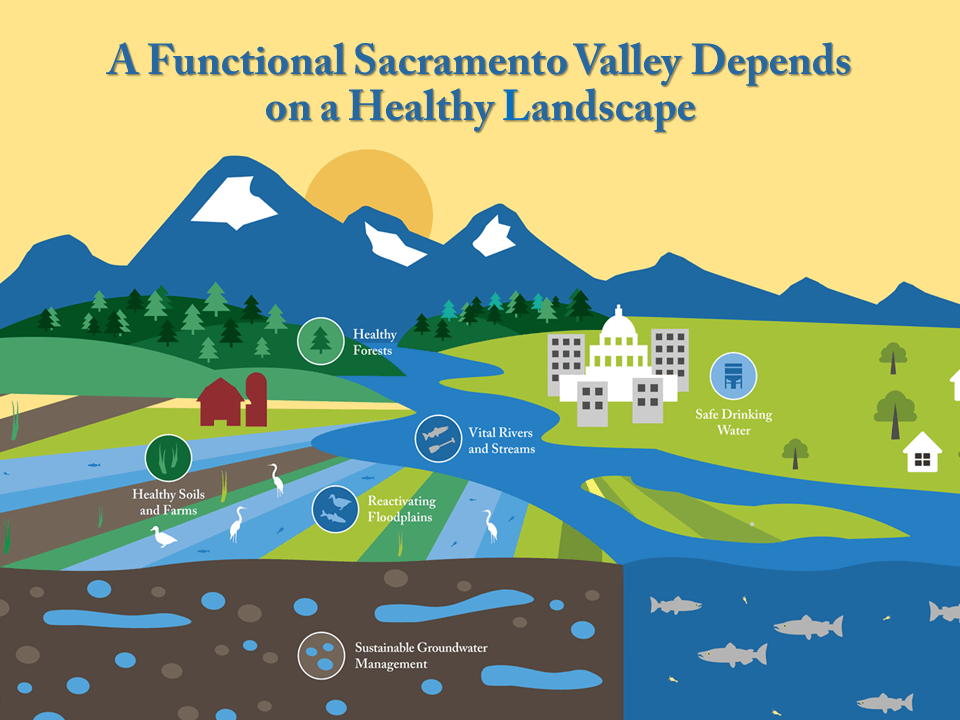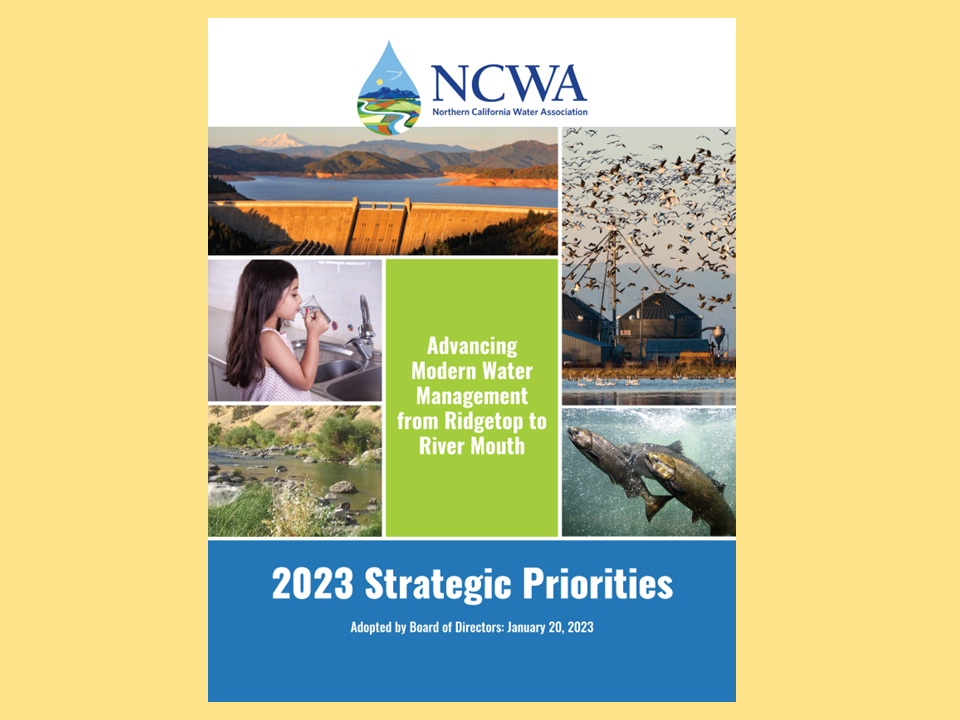The following is an excerpt from Bryce Lundberg’s chairman’s remarks at the NCWA Annual Meeting on March 3, 2023 at Sierra Nevada Brewery in Chico.
By Bryce Lundberg
It is a great honor to serve as the Chairman of the Northern California Water Association and to work with all of you to cultivate a shared vision in the region for a vibrant way of life–which is all dependent upon our precious water resources. We gather to share our common heritage in the Sacramento Valley, to explore what is exceptional about this region and its special attributes, and to focus on the importance of water resources to everything we do in Northern California. The Sacramento Valley is sourcing our sustainable future through responsible management of the essential resource that millions of birds, hundreds of thousands of fish, thousands of farms and millions of people all rely on–water.
Today, we will explore modern water management from ridgetop to river mouth and how our water is life—the farms and ranches, the cities and rural communities, the fish, waterfowl, and wildlife. Northern California’s water is the lifeblood for our families, our communities and the fish and wildlife that grace this region and our special way of life.
As we think about our priorities in 2023 and looking to the future, I will focus on two themes that will guide us this year and you will be hearing more about today through various speakers. The themes are: 1) advancing modern water management from ridgetop to river mouth and 2) the importance of a healthy landscape in the Sacramento Valley.

I. Advancing Modern Water Management
Last summer Governor Newsom released California’s Water Supply Strategy–which calls for the modernization of our water management system. We know that the Sacramento Valley continues to modernize everything we do, from our farms, communities and businesses, to the way we approach water. These improvements include adopting improved water efficiency, irrigation systems, and tools to measure water use. We are planting new varieties that are more productive and produce more crop per drop. We are investing millions to improve water delivery systems for the environment as well as for farms, cities, and disadvantaged communities. We have amazing coalitions that are working with landowners, rural communities and various technical experts to implement best management practices that ensure we have high quality water throughout the region. We are learning how to modernize groundwater recharge–working to make it less costly and cumbersome. We continue to modernize our efforts to help every freshwater life-stage of salmon–the salmon recovery program undertaken by everyone in the Sacramento Valley is making a difference. From specific projects to improve spawning habitat, providing refugia and safe-haven, and assuring adult and juvenile passage–to the landscape scale reactivation of the floodplain—nobody is making more investment and energy than you all to help recover our amazing salmon.
NCWA is helping to modernize all aspects of water management in our region. I continually hear from people who travel to various conferences in different parts of the world that the Sacramento Valley is on the cutting edge of modern water management and we are truly one of the few places in the world where we work so hard to manage water for multiple benefits. Yes, modernization is a continuous process and we have more work ahead, particularly knowing the weather whiplash and challenges we have seen over the past decade.

To meet this challenge, the NCWA Board of Directors, with your assistance and the leadership in the Valley, has developed a white paper that describes our vision for modernization as we look to the future. To summarize, a modernized water management system should advance four priorities to help the state adapt to a changing climate and to better manage through scarcity:
- continue to work hard to implement the state’s water rights priority system–which works in the Sacramento Valley–based on a more precise and sound water unavailability methodology that will continue to improve with better measurement, data, technology, and experience;
- allow the capture of water when available in California for use at a later time when needed—this includes groundwater recharge, water banks and new offstream storage such as Sites Reservoir. We know the importance of ground water recharge and our commitment to returning water to the aquifers; however, we are seeing that the cost is too high, the permit process is too complex, and several organizations won’t even try to engage–others suggest using alternate processes to accomplish this goal. I also believe that Sites Reservoir is one of the most important projects of our region and generation. It will be a lasting legacy of our water leader’s determination to build modern offstream surface water storage for the benefit of the North State and all Californians;
- enable regional and local agencies to work with our conservation partners and state and federal agencies to reimagine our water system from ridgetop to river mouth to better serve multiple benefits. This includes spreading water out and slowing it down across the landscape;
- ensure accountability through robust enforcement of water rights. For California to have a meaningful water rights system, we need to have strong enforcement. NCWA has been the loudest voice over the past decade at the State Water Board urging active and strong enforcement of the water rights process. This is not an academic case study as we are seeing in the Legislature—this is very real for every one of us and we need more active and timely enforcement to make this important system work for the Sacramento Valley and the State of California.
In sum, we fully support and will continue to work hard to modernize our water infrastructure and improve the water rights system to support 21st century water management. This ongoing effort will benefit from the expertise of our water resources managers and their consultants, partnering with state and federal agencies and conservation partners, to serve and steward water resources for multiple benefits, including cities and rural communities, farms, fish, wildlife, recreation and hydropower. Working together, we can modernize our water system and improve the administration of the water rights priority system as its legal and operational foundation with improved data, efficiency, and transparency.
You will be hearing more today from various perspectives on what a modern water system looks like in the Sacramento Valley. This includes reimagining our landscape, such as the floodplain and our watersheds; improving the administration of the water rights priority system; and modern infrastructure such as groundwater recharge, water banks and Sites Reservoir.
II. A Functional Sacramento Valley Depends upon a Healthy Landscape
We continue to learn from leading scientists and our recent experiences that the Sacramento Valley depends on a healthy landscape to support our communities, economy, fish and wildlife, and our vital rivers and creeks.

Let’s take a moment to think about water on the landscape and why this is so important. Take a look at the screen. Water on the landscape in this Valley does so much—it serves our:
- farms and our healthy soils;
- communities with both safe drinking water and the economic engine that supports people throughout this Valley;
- fish and wildlife—the more than 225 species that depend on our ricelands, the wildlife refuges, and the emerging work to reactivate our floodplains for the benefit of salmon and our vital rivers;
- groundwater aquifers, through both natural and managed recharge;
- forests and watersheds, which have been on fire for the past decade
Think about this for a moment, without water on the landscape, none of this exists. We all know this too well, as last year we saw 600 square miles on the west-side of the Sacramento Valley left fallow and brown, more than 370,000 acres. As a result of these unprecedented and dire conditions, there were impacts to every use of water–low supplies for rural disadvantaged communities resulting in drinking water impacts; agriculture leading to substantial fallowing of croplands and job losses; and significant environmental impacts to native fish, birds and other wildlife that depend on water on the landscape and in the rivers. A report by Daniel Sumner estimated that in the Sacramento Valley we lost: 14,300 jobs; $1.3 billion in lost economic value added; $732 million in lost labor income; and supply chains were devastated.
We can never let this happen again. It is our collective responsibility as a society to make sure we never see this happen again in the Sacramento Valley. We need water on the landscape for our farms, cities and rural communities (many of which are disadvantaged). We need water on the landscape for the 225 species that depend upon this water and we will continue to learn from leading scientists and our experiences that a healthy landscape with water is the key to our vital rivers and salmon recovery. We know that every water use benefits from water on the landscape and that families, farms, fish and fowl can all live together in harmony with modern water management. We need policy makers to join us in this effort and help us bring our landscape to life with our precious water resources.
To see the more detailed priorities for 2023, please look at the NCWA 2023 Priorities.

To conclude my remarks, I am so proud of the leaders in this room and all you do for Northern California! Northern California is a special and unique place. A place where farms, families, communities, and fish and wildlife have been connected to the land for generations and we can live together in harmony. A resilient place where we embrace new, imaginative, and modern ideas. I am also proud of the deep relationships we have with our elected leaders, water suppliers in every part of the state, the leaders in the conservation community, and our friends in the business community.
My friend Danny Rojas from Ted Lasso may say futbol is life. I say–Water is Life! It is the life blood to our families, farms, environment, communities, businesses, and our vibrant way of life. NCWA was formed to cultivate a shared vision in the region for a vibrant way of life, which is all dependent upon our precious water resources! Water is truly life!






